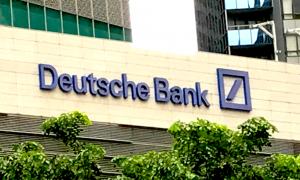
Deutsche Bank Pays U.S. Fines Over Bribery to Gain Business from the Middle East, China, and Italy
Posted on 01/13/2021
Deutsche Bank AG agreed to pay nearly US$ 130 million to settle bribery and spoofing charges. Investigations by the U.S. Justice Department (DOJ) and the Securities Exchange Commission (SEC) found that between 2009 and 2016, Deutsche Bank forked over US$ 7 million in hidden or improper payments to consultants and third-parties to help land deals in Saudi Arabia, Abu Dhabi, China, and Italy.
According to the SEC press release, “According to the SEC’s order, Deutsche Bank engaged foreign officials, their relatives, and their associates as third-party intermediaries, business development consultants, and finders to obtain and retain global business. The order finds that Deutsche Bank lacked sufficient internal accounting controls related to the use and payment of such intermediaries, resulting in approximately $7 million in bribe payments or payments for unknown, undocumented, or unauthorized services. The order further finds that these payments were inaccurately recorded as legitimate business expenses and involved invoices and documentation falsified by Deutsche Bank employees.”
The SEC’s order finds that Deutsche Bank violated the books and records and internal accounting controls provisions of the Securities Exchange Act of 1934. Deutsche Bank agreed to a cease-and-desist order and to pay disgorgement of US$ 35 million with prejudgment interest of US$ 8 million to settle the action. The SEC did not impose a civil penalty in light of the US$ 79 million criminal penalty paid in the criminal resolution.
From the SEC ADMINISTRATIVE PROCEEDING File No. 3-20200, “Consultant B –Abu Dhabi BDC
17. Between 2010 and 2011, Deutsche Bank retained and paid Consultant B to obtain a specific deal (“Project X”) with an Abu Dhabi sovereign wealth fund (“Abu Dhabi SOE”). Consultant B approached Deutsche Bank about Project X and within weeks of that meeting, Deutsche Bank employees understood that Consultant B’s brother would also be involved in the proposed BDC engagement, although Deutsche Bank did not immediately engage either of them.
18. During this same time period, an Abu Dhabi SOE Official with authority to influence the award of Project X was pressuring Deutsche Bank to finance a mega-yacht. One email from an Abu Dhabi SOE official read: “[Abu Dhabi SOE Official] has asked me to get in touch with DB: reputationally, this financing is regarded as absolutely crucial, and [Abu Dhabi SOE Official] made the point very forcefully that those institutions which participate in it can expect in future to enjoy ‘most favoured status’ with [the Abu Dhabi SOE].”
19. Deutsche Bank employees working on Project X encouraged the Bank to finance the mega-yacht in order to influence the Abu Dhabi SOE Official and better position Deutsche Bank to obtain Project X. The Bank agreed to do so. Despite that, a banker working to obtain Project X expressed concern that there was still “no guaranty” that Deutsche Bank would win Project X and told a senior executive at Deutsche Bank, “We need to close the [Consultant B and brother] angle within the next 48hrs. Need ur [sic] leadership and influence on getting it thru GMRAC.” The senior executive agreed to sponsor the BDC arrangement, but expressed concern about entering into a BDC arrangement shortly before Project X would be awarded.
20. At the time Consultant B was retained as a BDC, Deutsche Bank knew Consultant B was a relative of the Abu Dhabi SOE Official, a high ranking official of and key decision maker for the Abu Dhabi SOE. Deutsche Bank knew that Consultant B was a proxy for the Abu Dhabi SOE Official and that it needed to pay Consultant B to obtain the Abu Dhabi SOE’s business. A Deutsche Bank employee described Consultant B as a “gatekeeper” to the Abu Dhabi SOE Official who expected to be paid for his services. At the time Consultant B was retained as a BDC, the Regional Head of Compliance, the banker acting as business sponsor, and the senior executive each knew that Consultant B’s brother would be working with Consultant B, but did not disclose the role of Consultant B’s brother in the BDC arrangement and Consultant B’s brother did not sign a BDC contract with Deutsche Bank.
21. Consultant B’s engagement was approved by the then-Global Markets Risk Assessment Committee (“GMRAC”), which included senior-level Deutsche Bank executives. Despite the requirements of the BDC Policy, the GMRAC at the time approved the engagement despite the lack of due diligence on Consultant B, and without assessing or mitigating corruption risks and conflicts of interest related to the retention which included: 1) Consultant B was related to the Abu Dhabi SOE Official, a key decision maker at the SOE from which Deutsche Bank sought business; 2) Consultant B had no known qualifications for the role; and 3)the fact that the Abu Dhabi SOE Official had made repeated requests to Deutsche Bank to finance a mega-yacht as a means to help position Deutsche Bank to obtain Project X.
22. Deutsche Bank was awarded Project X shortly after it retained Consultant B. Within a week after Consultant B was retained as a BDC, Deutsche Bank paid him more than $2 million for his purported legitimate services.
23. Consultant B was paid approximately $3.5 million without invoices or other documentation to support the payments; the agreement itself did not call for Consultant B to perform any services other than to provide generic advice and introductions; and the payments were not proportionate to any legitimately rendered services. Despite this, a senior Deutsche Bank executive approved the payments. As a result, Deutsche Bank was unjustly enriched by approximately $30 million.”
